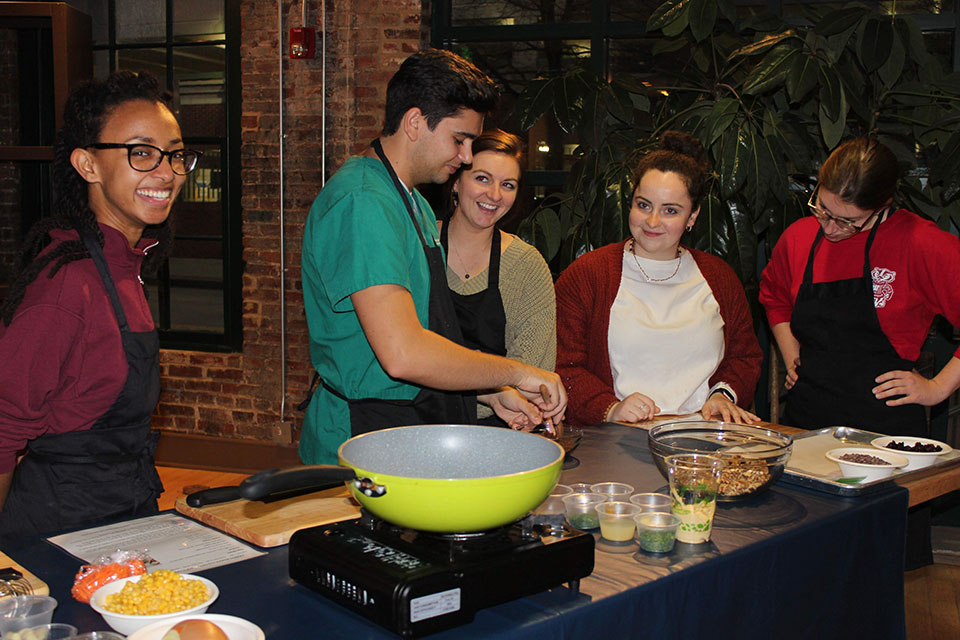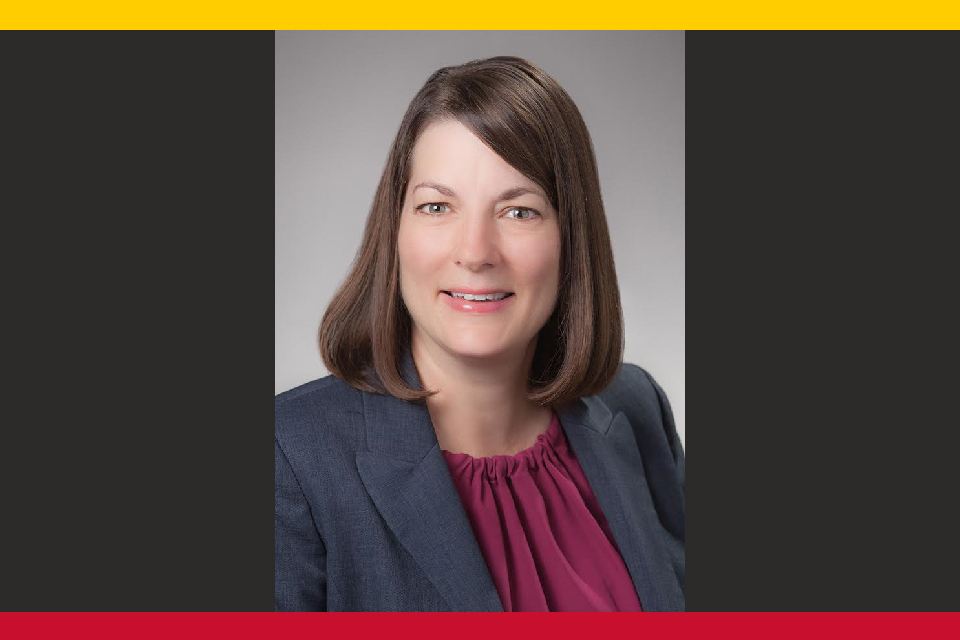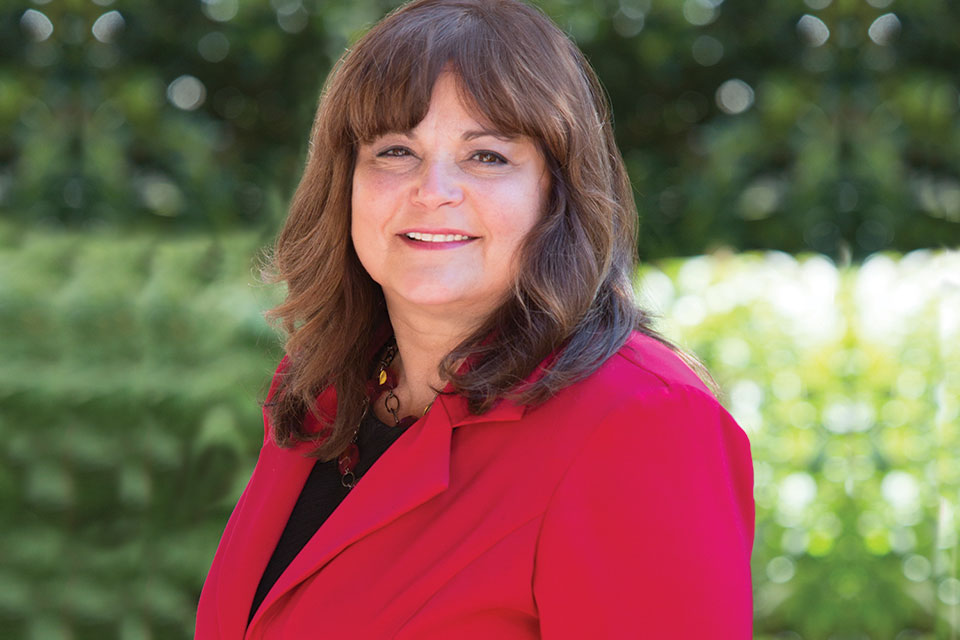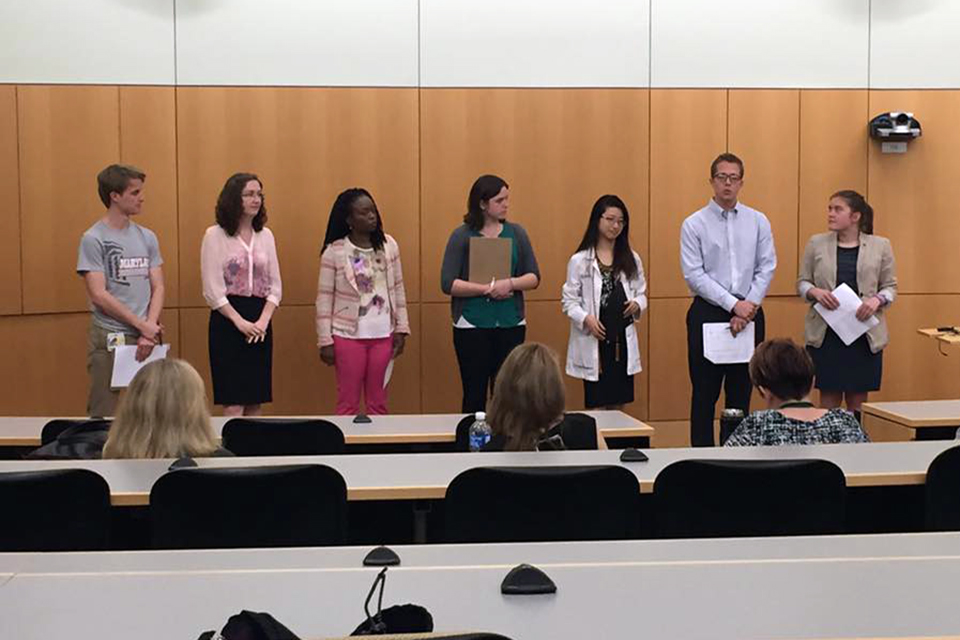Partnerships Are ‘Chef’s Kiss’ at IPE Seed Grant Symposium
The barriers that prevent patients in underserved communities from making nutritious meals extend beyond shopping for the right food.

By Charles Schelle
November 19, 2020
“In the patient population that I see, I frequently come across people who just don’t have any cooking skills,” said Lauren Hynicka, PharmD, BCPS, associate professor in the Department of Pharmacy Practice and Science at the University of Maryland School of Pharmacy (UMSOP). “They might not even have a stove or the proper utensils and cookware to prep the meals.”
Health professionals can face similar challenges in providing the proper nutrition education to their patients. To overcome that, 24 University of Maryland, Baltimore (UMB) students from the schools of pharmacy, dentistry, law, and medicine enrolled in a 1-credit culinary health and medicine elective in the spring hosted at The Institute for Integrative Health in Harbor East.
The elective provides an opportunity for students outside of the University of Maryland School of Medicine, which includes culinary medicine as part of its core curriculum, to add to the breadth of patient care. Christopher D’Adamo, PhD, director of research and associate director, Center for Integrative Medicine, also was part of the course team.
Hynicka’s presentation was one from four teams that presented results of their 13-month interprofessional education (IPE) and interprofessional care projects funded through UMB’s Center for Interprofessional Education (CIPE) at a Nov. 18 faculty symposium via Webex. The grants ranged from $10,200 to $15,000.
“For me as a prior transplant surgeon, interprofessional care of the patients was the only way you took care of them,” UMB President Bruce E. Jarrell, MD, FACS, said. “Having that as part of our learning objective is really important to me.”
(Watch a replay of the symposium on Webex.)
CIPE, directed by Jane M. Kirschling, PhD, RN, FAAN, dean of the University of Maryland School of Nursing, is a national leader in providing interprofessional education for health, law, and human services professionals that is grounded in best practices for educational innovation and assessment.
In the elective, students learned evidence around paleo, Mediterranean, and vegetarian diets, and cooked recipes based on those diets including an appetizer or side dish, main entrée, and a dessert. They also modified a favorite recipe using the nutrition education learned from the course. COVID-19 restrictions bumped the course online during the spring semester, switching the planned potluck to a virtual dish sharing as well as missing out on the West Baltimore community outreach.
While that element was missing, the possibilities excited members in the audience such as Heather Congdon, PharmD, CACP, CDE, assistant dean for UMSOP at the Universities at Shady Grove and co-director of CIPE. Congdon thinks the lessons learned would be great for students from the pharmacy, nursing, and social work schools working at interprofessional clinics to share with patients in underserved communities who have uncontrolled diabetes or other chronic diseases.
“All they wanted to know was, ‘What are we able to eat?’ ” Congdon said. “So this would have been a perfect course for students who then come to our clinic because we are trying to educate our patients on what to eat.”
Speaking of what’s to eat, what was on Hynicka’s plate for Wednesday night?
“Tonight might be some turkey meatballs and roasted broccoli,” she said.
The course will be offered again, this time exclusively online, for the spring 2021 semester.
These presentations of success and challenges with interprofessional projects can be made stronger through the ideas of peers, just like the idea of bringing students together across disciplines.
During another presentation, Jarrell encouraged the team behind an app for memorizing antimicrobial management facts called Microbe Master to link up with Laurie E. Locascio, PhD, MSc, vice president for research at UMB and the University of Maryland, College Park (UMCP) for solutions that could potentially resolve budget and maintenance constraints for the app by tapping into partnerships through UMCP.
“We have stood up a number of competitions with the College Park undergraduates to create apps. It’s been inexpensive. They’ve been extremely creative. For the future, if we have some of these things, I would consider that pathway,” Jarrell said.
The app was piloted by second-year pharmacy students during their Infectious Diseases Therapeutics core class. Mark A. Reynolds, DDS, PhD, MA, dean of University of Maryland School of Dentistry, championed the applicability of core education as a study aide in Microbe Master.
“It’s the core curriculum that’s often incorporated in licensure and boarding examinations, and that’s where I could see you taking this and not only using this as an adjunct educational process, but focusing it to prepare graduates for examinations after their program.,” Reynolds said.
Here are the IPE 2019-2020 seed grant projects and team members:
“Using Gamification to Enhance the Learning of Interprofessional Antimicrobial Management”
- Kimberly Claeys, PharmD, BCPS — School of Pharmacy
- Emily Heil, PharmD, CPS AQ-ID, AAHIVP — School of Pharmacy
- Neha Sheth Pandit, AAIVP, BCPS — School of Pharmacy
- Roseann Velez, DNP, CRNP, FNP-BC, FAANP — School of Nursing
- Jacqueline Bork, MD — School of Medicine
- Kerri Thom, MD — School of Medicine
“Interprofessional Care for Head and Neck Radiation Patients”
- Dima Ghunaim, DDS, MS, FACP — School of Dentistry/UMMC
- Tiffani Tyer, CRNP-AC, AOCNP — University of Maryland Medical Center (UMMC)
- Cynthia Idzik-Starr, DDS — School of Dentistry
- Donita Dyalram, MD, DDS, FACP — School of Medicine/UMMC
- Bridgitte Gourley, DNP, FNP-BC — School of Nursing
“An Interprofessional Training to Improve Advance Care Planning Skills of Students and Healthcare Professionals by Collaborating with Oncology and Palliative Care Champions”
- Leah S. Millstein, MD — School of Medicine
- Paula Rosenblatt, MD — School of Medicine
- John Cagle, PhD, MSW — School of Social Work
- John Allen, MD — School of Medicine
- Mel Bellin, PhD, LCSW — School of Social Work
- Steven R. Eveland, MBA, RN, CHPN — School of Social Work
- Mei Ching Lee, RN, PhD, CHPN — School of Nursing
- Barbara Perez Marquez, MFA — School of Medicine
“Interprofessional Education Awareness (IDEA) for Maternal Opioid Use Disorder (OUD)”
- Doris Titus-Glover, PhD, MSN — School of Nursing
- Rebecca Wiseman, PhD, RN — School of Nursing
- Fadia T. Shaya, PhD, MPH — School of Pharmacy
- Kathleen Hoke, JD — School of Law
- Christopher Welsh, MD — School of Medicine
- Jamie E. Swietlikowski, MS — School of Medicine
- Rebecca Vivrette, PhD — School of Medicine
- Katherine Fornili, DNP, MPH, RN, CARN, FIANN — School of Nursing
“Development of an Interprofessional Culinary Health and Medicine Elective”
- Christopher D’Adamo, PhD — School of Medicine
- Lauren M. Hynicka, PharmD, BCPS — School of Pharmacy



